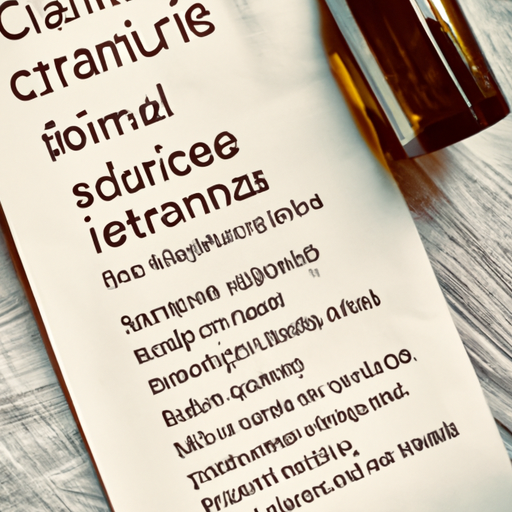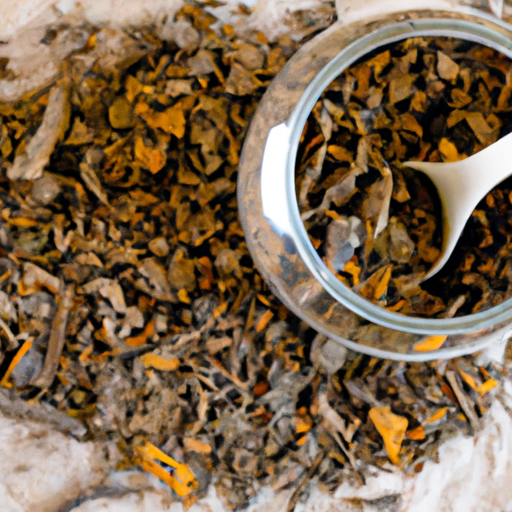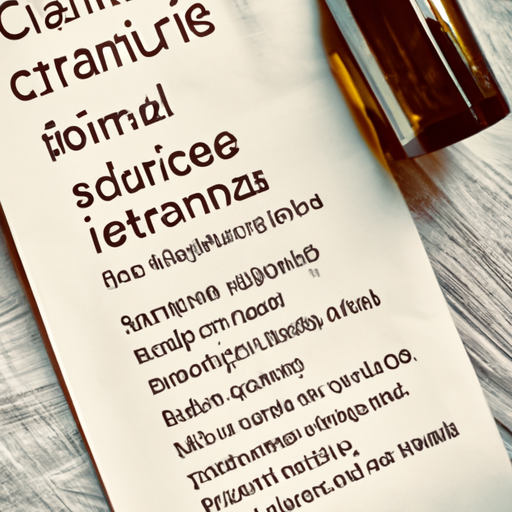Have you ever found yourself feeling anxious or overwhelmed? It’s a common experience that many of us can relate to. But have you ever considered trying natural ways to help manage your anxiety? In this article, we’ll explore some simple yet effective techniques that you can incorporate into your daily routine. So if you’re looking for alternative ways to calm your mind and find some peace, keep reading!
One natural way to help alleviate anxiety is through regular exercise. Not only does exercise have numerous physical benefits, but it can also do wonders for your mental health. When you engage in physical activity, your body releases endorphins which are known as the “feel-good” hormones. These endorphins can help boost your mood and reduce feelings of stress and anxiety. Whether it’s going for a brisk walk, practicing yoga, or hitting the gym, finding a form of exercise that you enjoy can make a significant difference in managing your anxiety levels.
Another natural method that can help reduce anxiety is practicing deep breathing exercises. When we’re feeling anxious, our breath tends to become shallow and rapid. By focusing on deep, slow breaths, you can activate your body’s relaxation response. One simple technique is called diaphragmatic breathing, where you breathe in deeply through your nose, allowing your stomach to expand, and then exhale slowly through your mouth. Incorporating deep breathing exercises into your daily routine, especially during stressful moments, can help calm your mind and promote a sense of relaxation.
Additionally, incorporating mindfulness and meditation into your life can be an effective way to combat anxiety. Mindfulness involves bringing your attention to the present moment and accepting it without judgment. By practicing mindfulness, you can train your mind to let go of worries about the past or future, allowing you to experience a greater sense of calm and peace. Meditation, on the other hand, involves focusing your mind and eliminating the stream of thoughts that may be causing anxiety. There are various techniques and guided meditations available that can help you get started on your meditation journey. So, if you’re ready to explore these natural techniques further, read on for more detailed information on how to incorporate them into your daily life.
Understanding Anxiety
Anxiety is a common mental health issue that affects millions of people worldwide. It is characterized by excessive worry, fear, and nervousness, often impacting a person’s daily life. While everyone experiences feelings of anxiety from time to time, for some individuals, it becomes a chronic condition that requires treatment. In this article, we will explore various natural ways to help manage and reduce anxiety, without relying solely on medication.
Defining Anxiety
Anxiety can manifest in different forms, including generalized anxiety disorder (GAD), panic disorders, phobias, and social anxiety disorder. GAD is the most common type, where individuals experience excessive and persistent worry about various aspects of their lives, such as work, health, or relationships. Panic disorders involve sudden and intense panic attacks, while phobias and social anxiety disorder involve excessive fear of specific situations or objects.
Causes of Anxiety
Anxiety can arise from a combination of factors, including genetics, brain chemistry, personality traits, and life experiences. Some individuals may have a genetic predisposition to anxiety disorders, making them more likely to develop the condition. Stressful life events, trauma, and major life changes can also trigger or exacerbate anxiety. Additionally, certain medical conditions, such as heart disease, thyroid problems, and substance abuse, can contribute to anxiety.
Symptoms of Anxiety
Anxiety can present both physical and psychological symptoms. Common physical symptoms include increased heart rate, rapid breathing, sweating, trembling, and gastrointestinal issues. On the psychological front, individuals may experience excessive worry, irritability, difficulty concentrating, restlessness, and sleep disturbances. These symptoms can significantly impact a person’s quality of life, making it essential to find natural ways to alleviate anxiety.
Benefits of Natural Remedies
One of the primary benefits of natural remedies for anxiety is the avoidance of side effects often associated with medication. While medication can be effective in managing anxiety symptoms, it can also cause unwanted side effects such as drowsiness, dizziness, and nausea. By opting for natural remedies, you can minimize the risk of experiencing these adverse effects.
Another advantage of natural remedies is their ability to address underlying causes of anxiety. Unlike medication, which primarily focuses on managing symptoms, natural remedies often aim to tackle the root causes of anxiety. By addressing these underlying issues, individuals can experience long-term relief from anxiety.
Lastly, natural remedies for anxiety often promote overall well-being. Many natural approaches, such as exercise, mindfulness, and a healthy diet, not only help manage anxiety but also improve overall physical and mental health. By adopting these holistic practices, individuals can enhance their overall well-being and resilience in the face of anxiety.
Exercise and Physical Activities
Exercise has long been recognized for its positive impact on mental health, including anxiety relief. Engaging in regular physical activity releases endorphins, which are natural mood-boosting chemicals in the brain. These endorphins help reduce feelings of anxiety and promote a sense of well-being.
When it comes to anxiety relief, there is no one-size-fits-all exercise. Different activities can have varying effects on individuals, so it’s essential to find the exercises that work best for you. Some recommended exercises for anxiety relief include cardio exercises like running or biking, as well as calming activities like yoga or tai chi. Experimenting with different types of exercises can help identify the ones that provide the most significant anxiety reduction for you.
Incorporating physical activities into your daily routine is crucial for long-term anxiety management. Aim for at least 30 minutes of moderate-intensity exercise most days of the week. This can be achieved by walking or biking to work, taking the stairs instead of the elevator, or participating in a group fitness class. By making exercise a regular part of your routine, you can reap the anxiety-relieving benefits it offers.
Mindfulness and Meditation
Mindfulness is the practice of being present and fully engaged in the current moment, without judgment. It involves paying attention to your thoughts, emotions, and sensations, without getting caught up in them. Mindfulness can be a powerful tool in managing anxiety, as it helps individuals become more aware of their anxious thoughts and emotions, allowing them to respond to them in a healthier way.
Meditation is a technique used to cultivate mindfulness. It involves focusing the mind on a particular object, such as the breath or a specific mantra, to achieve mental clarity and emotional calmness. Regular meditation practice has been shown to reduce anxiety symptoms and promote a sense of calm and relaxation.
There are various meditation techniques that can be particularly beneficial for anxiety relief. One simple technique is mindfulness meditation, where you focus your attention on the present moment and bring your mind back whenever it wanders. Another effective technique is loving-kindness meditation, where you cultivate feelings of love, compassion, and goodwill towards yourself and others.
Utilizing mindfulness in your daily life can also help manage anxiety. By incorporating mindful practices such as mindful eating, mindful walking, and mindful breathing, you can bring a sense of awareness and calmness to your daily activities. Taking a few moments throughout the day to check in with yourself and observe your thoughts and emotions can have a profound impact on reducing anxiety.
Herbal Supplements
Herbal supplements have been used for centuries to promote overall health and well-being. Some herbs are particularly beneficial in reducing anxiety symptoms. It’s important to note that while herbal remedies can be effective, they may not work for everyone, and it’s crucial to consult with a healthcare professional before adding any new supplements to your routine.
Some popular herbal remedies for anxiety include:
- Chamomile: Chamomile has calming properties and is often consumed as a tea to promote relaxation and relieve anxiety symptoms.
- Valerian root: Valerian root is commonly used as a sleep aid but can also help reduce anxiety symptoms. It works by increasing levels of the neurotransmitter gamma-aminobutyric acid (GABA), which has a calming effect on the brain.
- Passionflower: Passionflower has been shown to have anxiolytic effects, reducing anxiety symptoms and promoting relaxation.
- Ashwagandha: Ashwagandha is an adaptogenic herb that helps the body manage stress and reduce anxiety. It can be consumed in supplement form or as a herbal tea.
- Lavender: Lavender essential oil or tea has soothing properties that can help reduce anxiety and promote relaxation.
Dosage and safety considerations are essential when using herbal supplements. It’s important to follow the recommended dosages provided by reputable sources or consult with a healthcare professional. Additionally, be aware of any potential interactions with other medications you may be taking.
While some studies have shown promising results regarding the effectiveness of herbal supplements for anxiety, more research is needed to fully understand their mechanisms of action and long-term effects.
Diet and Nutrition
What we eat can significantly affect our mental health, including anxiety levels. Incorporating specific foods into your diet and ensuring proper nutrition can play a significant role in managing anxiety symptoms.
Foods that help reduce anxiety include:
- Foods rich in omega-3 fatty acids: Omega-3 fatty acids have been shown to have a positive impact on mental health. Include fatty fish like salmon, chia seeds, and walnuts in your diet to boost your omega-3 intake.
- Foods high in magnesium: Magnesium is known to have a calming effect on the nervous system. Incorporate foods like dark leafy greens, nuts, and whole grains into your diet to increase your magnesium levels.
- Probiotic-rich foods: The gut-brain connection is well-established, and a healthy gut can contribute to better mental health. Include fermented foods like yogurt, sauerkraut, and kimchi in your diet to support a healthy gut microbiome.
- Foods rich in B vitamins: B vitamins, particularly vitamin B6 and B12, play a crucial role in brain function and regulating mood. Incorporate foods like whole grains, leafy greens, and lean meats into your diet to ensure an adequate intake of B vitamins.
- Herbal teas: Teas made from herbs like chamomile, passionflower, and lavender can have calming effects on the mind and body, helping reduce anxiety symptoms.
In addition to specific foods, certain nutrients and supplements can also support anxiety management. These include magnesium supplements, vitamin D supplements (particularly in individuals with vitamin D deficiency), and herbal adaptogens like rhodiola and ginseng. As with herbal supplements, it’s important to consult with a healthcare professional before adding any new supplements to your routine.
Creating a balanced anxiety-reducing diet involves incorporating a variety of whole foods while limiting processed foods, caffeine, and excessive sugar intake. A healthy diet not only promotes physical well-being but also provides the nutrients needed for optimal brain function and emotional well-being.
Breathing Techniques
Proper breathing is essential for managing anxiety and promoting relaxation. When we feel anxious, our breathing tends to become shallow and rapid. This can further exacerbate anxiety symptoms, as it sends signals to the brain that something is wrong. Learning and practicing various breathing techniques can help override this response and induce a state of calmness.
One important aspect of proper breathing is diaphragmatic breathing, also known as deep belly breathing. This type of breathing involves engaging the diaphragm to take slow, deep breaths, filling the lungs with fresh oxygen and releasing tension from the body.
To practice diaphragmatic breathing, find a quiet and comfortable place to sit or lie down. Place one hand on your chest and the other on your abdomen. Take a slow, deep breath in through your nose, feeling your abdomen rise as the air fills your lungs. Exhale slowly through your mouth, allowing your abdomen to fall. Aim to repeat this deep breathing pattern for a few minutes, focusing on the sensation of your breath and allowing your body to relax with each exhale.
Other breathing techniques that can be useful for anxiety relief include box breathing, where you inhale, hold, exhale, and hold your breath in equal counts, and 4-7-8 breathing, where you inhale for a count of 4, hold for a count of 7, and exhale for a count of 8.
Implementing breathing techniques in stressful situations can help calm the nervous system and bring about a sense of relaxation. Practice these techniques regularly to make them a natural response to anxiety-inducing situations.
Quality Sleep and Relaxation
The quality of sleep we get has a significant impact on our mental health, including anxiety levels. Lack of sleep can exacerbate anxiety symptoms and contribute to a cycle of worry and restlessness. Establishing a bedtime routine and practicing relaxation techniques can greatly improve sleep quality and help manage anxiety.
Establishing a regular sleep routine involves going to bed and waking up at consistent times, even on weekends. This helps regulate your body’s internal clock and promotes better sleep. Avoid stimulating activities, electronics, and caffeine close to bedtime, as these can interfere with sleep.
Relaxation techniques, such as progressive muscle relaxation and guided imagery, can help prepare your body and mind for sleep. Progressive muscle relaxation involves systematically tensing and relaxing muscle groups, helping release tension and promote relaxation. Guided imagery involves imagining pleasant and relaxing scenes, engaging your senses and calming the mind.
In addition to relaxation techniques, creating a calming environment in your bedroom can contribute to better sleep. Ensure your sleep environment is dark, quiet, and free from distractions. Consider using relaxing aromatherapy techniques, such as lavender essential oil or a soothing diffuser, to create a peaceful ambiance.
Social Support and Connection
Social relationships play a vital role in managing anxiety. Having a support network of friends and family who understand and empathize with your struggles can provide a sense of comfort and relief. Seeking support from loved ones during times of anxiety can help alleviate feelings of loneliness and provide a safe space to express your emotions.
In addition to close relationships, joining support groups or therapy can be beneficial for individuals with anxiety. Support groups provide an opportunity to connect with others who share similar experiences and learn coping strategies from one another. Therapy, whether individual or group-based, can provide a structured and supportive environment where you can explore the root causes of your anxiety and develop effective coping mechanisms.
It’s important to remember that seeking professional help is always an option. Mental health professionals, such as therapists and psychiatrists, are trained to diagnose and treat anxiety disorders. They can provide personalized treatment plans and guidance that cater to your specific needs.
Conclusion
Navigating the challenges of anxiety can be overwhelming, but there are natural ways to help manage and reduce anxiety symptoms. Incorporating these natural remedies into your daily routine can provide relief and promote overall well-being.
Understanding anxiety and its various forms is the first step towards effective management. Identifying the underlying causes of anxiety and addressing them through natural means can bring about long-term relief. Incorporating regular exercise, mindfulness, and meditation can help calm the mind and promote mental resilience. Herbal supplements, a balanced diet, and proper nutrition can support anxiety management from within. Breathing techniques, quality sleep, and relaxation techniques are essential for calming the nervous system and inducing a state of relaxation. Finally, social support and connection can provide comfort and guidance throughout the anxiety management process.
Remember, everyone’s journey with anxiety is unique, and it may take time to find the combination of natural remedies that work best for you. It’s crucial to be patient and open-minded, exploring different methods and seeking professional help if needed. By embracing these natural ways to help anxiety, you can take control of your mental health and find peace in your daily life.


